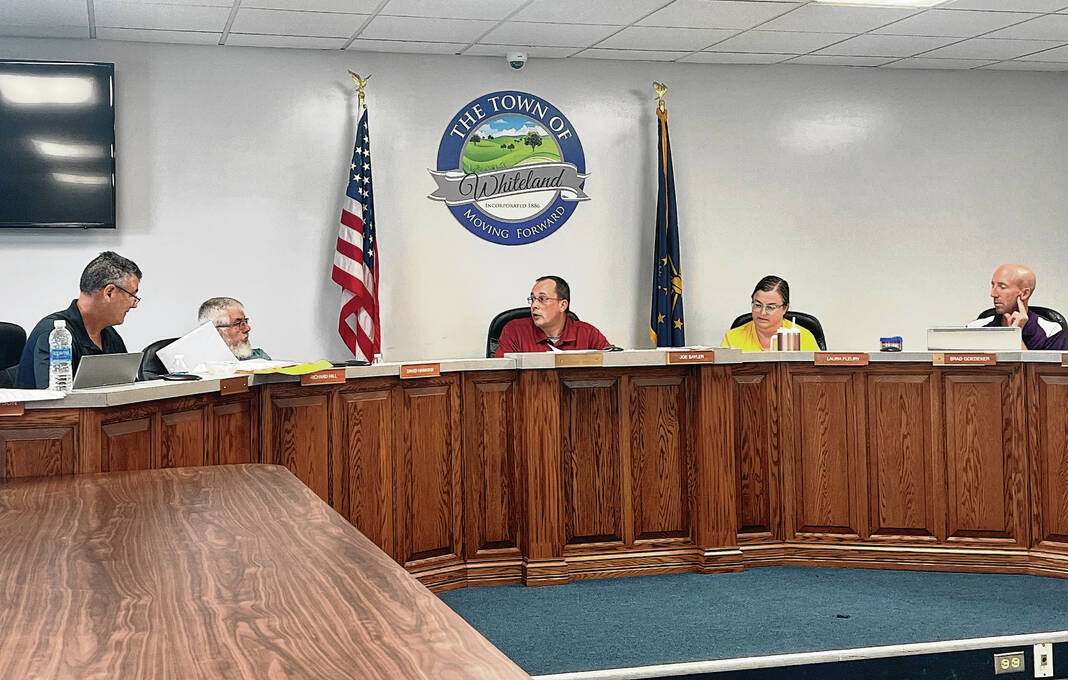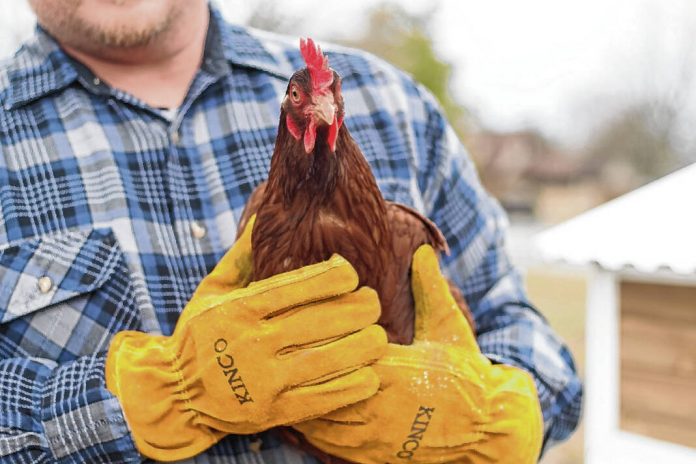Feathers were ruffled among Whiteland council members, who on Tuesday argued again over details in a proposal to allow backyard chickens in town.
The Whiteland Town Council split in a 3-2 vote to pass another amended version of an ordinance to allow backyard chickens. This version of the ordinance will go back to the planning commission for consideration next month.
Council members were divided in their decision, between those for allowing owning chickens and those against. Members David Hawkins and Richard Hill, who have both been against allowing chickens in residential areas from the beginning, voted against the measure.
Debate among the five council members ensued Tuesday evening for nearly an hour. Those for and against chickens argued over how strict the ordinance should be, and what details should be outlined.
The three members in favor of allowing chickens argued that the proposed edits from the opposition would make the ordinance so strict it would be nearly impossible for a resident to get a permit to keep chickens. The two opposed said those in favor were not being strict enough in their suggestions, and were “not protecting the town.”
What’s in this draft
The majority of council members opted to largely keep the backyard chickens draft the same as what was amended and passed in June. President Joe Sayler and members Brad Goedeker and Laura Fleury each passed amendments to add more meat to the proposal that came out of that June meeting.
Hill and Hawkins voted against every amendment made by the other three council members, even though all of those changes were pieces pulled from a different draft they proposed.
Residents could keep up to six adult hens on a single-family or two-family residential lot. Roosters would not be permitted, the draft says. This ordinance would not overrule any already established rules against owning chickens in subdivisions with homeowners’ associations or covenants.
Chickens would have to be kept in a coop, pen or chicken run that is within a fully fenced yard, with a fence at least four feet tall. Coops could not be larger than 120 square feet in area and 10 feet high, with a minimum of six square feet of run space per animal.
A permit would be required to own chickens, which could be acquired through the Whiteland Board of Zoning Appeals.
Much like the process to build another accessory structure, residents would need to show town officials what the enclosure will look like and where on the property it will go, the draft says. The proposed structure would be subject to an in-person inspection by the town or a third-party.
Waste would have to be removed on a regular basis and the smell of the waste should not reach beyond the property line. Waste, anything contaminated by the waste, or chicken carcasses cannot be disposed of through Whiteland’s municipal trash services.
Additional clarifications related to waste were added Tuesday. One included that if a property owner fails to properly dispose of waste and it causes contamination, the owner would be responsible for costs incurred to clean that up. Another addition details that if a chicken permit holder moves and leaves behind any chicken waste or byproducts, they would be responsible for the cost for clean-up.
Applicants for chicken permits would be required to follow the legal procedure for a public hearing, including notifying adjoining property owners within “two property depths” or within 660 feet of the property. Those neighbors would be allowed to submit written objections or appear at the BZA hearing to speak on the chicken permit.
A chicken permit would not have to be renewed on a regular basis, and would be indefinite. But permit holders would be subject to regular inspections by the town or a third-party, the most recent draft says.
Debate over restrictions
At the June council meeting, council members requested that Town Attorney Stephen Watson draft another version of the ordinance with language suggested by Hill and a staff report from Carmen Young, director of administration.
That version included more guidelines on what a chicken coop could look like, such as having windows, predator-proof wire, a door that locks and more. It also included provisions that would require property owners to have some type of landscaping or fencing around the chicken area to make it not visible from the street or sidewalk.
Young said many of those provisions she pulled from other municipalities’ codes that allow chickens, and those were in place to protect chickens from other animals.
This version of the document also set a $35 fee to obtain a chicken permit that would only last one year.
Hill additionally submitted his own edits to that version, changing several provisions. Hill proposed shrinking the allowed chicken coop size to 80 square feet, and he wanted to require a privacy fence that would be at least six feet tall. He also wanted to double the violation fees.
“Basically an eight by 10 by seven foot, which would give somebody still access to get in and clean and tidy up and do whatever they do with chickens,” Hill said. “I thought 120 square feet was too much.”
Goedeker and Sayler during the meeting said they thought Hill’s proposal and the ordinance reworked by Watson were too restrictive to the point where no one in town could obtain a permit.
Sayler said the cost alone of having to put up a privacy fence, landscaping and specific coop materials would deter people. Since the proposed ordinance could not conflict with established homeowners association or covenant rules, it already only applies to a small group of people in town, he added.
“It just looks to me like we’re just going to say, ‘hey you can have chickens, but you really can’t have chickens,’” Sayler said.

Hawkins chimed in, saying he thought it was “ridiculous” the town was even considering allowing chickens, since no other city or town around them allows people to keep chickens in residential neighborhoods.
“If you want to have chickens, move out of town,” Hawkins said. “… it’s ridiculous we’ve even gotten as far as we have.”
Hill said he’s worked so much on this ordinance because he wants to protect the town. He motioned to adopt his entire amended text with all the changes he proposed. It failed by a vote of 2-3, with Fleury, Goedeker and Sayler voting against it.
“You folks made a comment about being too restrictive, and now you’re going to make it not protect the town,” Hill said.
Hill then commented that Sayler should not make an ordinance based on his personal opinions because he has said in a previous meeting that he would like to own chickens.
“You have a bias for this to remove some of these restrictions,” Hill said to Sayler.
Sayler responded saying Hill was making a “grave accusation.”
“I’d caution whether or not you want to throw that out,” Sayler said.
“You said it, I didn’t. You said you wanted chickens,” Hill replied.
“So you’re implying that I can’t do what’s best for the town? That’s a pretty insulting thing to say,” Sayler said.
“Well, I’m doing what’s best for the town,” Hill said.
Too many drafts
By Tuesday’s meeting, the council was up to at least five different iterations of a backyard chickens ordinance, which was first crafted in March.
Because there were so many versions, council members were confused about which version they were supposed to be considering, and what happened to the draft they changed and voted on in June. Council members spent a lot of time during the meeting figuring out what documents they actually had and what provisions were in which version.
“We’ve got so many versions, add-ons and varieties, nobody actually knows where we’re working from,” Hawkins said.
The consensus was they were making amendments to a version of the ordinance they passed in June, but they later learned that copies of that version were not included in their packets for the meeting. They only had the red-lined draft from Watson and Hill’s marked-up draft in front of them.
Sayler began making amendments to Watson’s draft to remove provisions such as the one-year permit renewal and edit the violation fee schedule, only to be told those changes weren’t necessary because they weren’t in the June version.
“I was kind of concerned we weren’t provided with the correct version,” Sayler said.
What’s next
Next, the Whiteland Advisory Plan Commission can reconsider this chicken ordinance the council passed as early as Aug. 1 and could send it back to the council that same month. The board has 45 days to take action.
The commission can again either issue a favorable or unfavorable recommendation. This body already gave a previous version of the chicken ordinance from April an unfavorable recommendation by a vote of 4-0.
After the planning commission, the council will then have to vote on the ordinance twice again over the next two months. September would be the earliest a final vote could take place.
Shawn Butler —a resident who currently owns 12 chickens and inspired the efforts to change the town code in February — continues to stand by his stance that he should not have to ask the town for permission to own any animals, he said Tuesday.
“If I want three Great Danes on a quarter acre, do I have to request permission? No,” Butler said. “Great Danes are about 300 pounds. My 12 chickens are less than 100 pounds.”
Butler then got into a brief argument with Sayler and Hawkins, who told him to sit down because he reached the time limit to speak.
“This is ridiculous,” Butler said. “I can’t speak when you guys spend 45 minutes debating, and I get two minutes with you interrupting me.”





